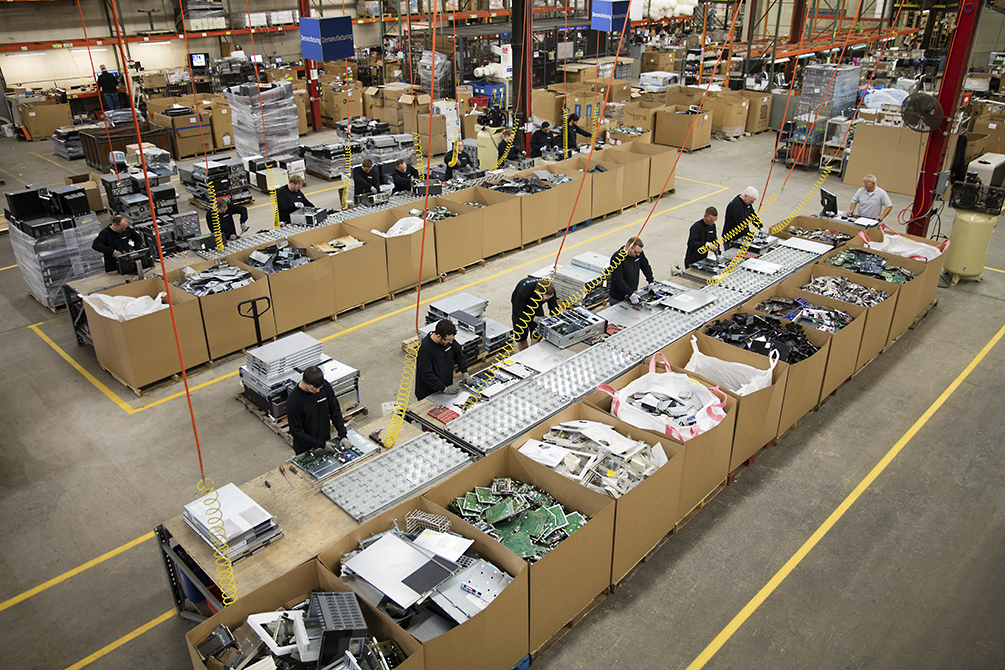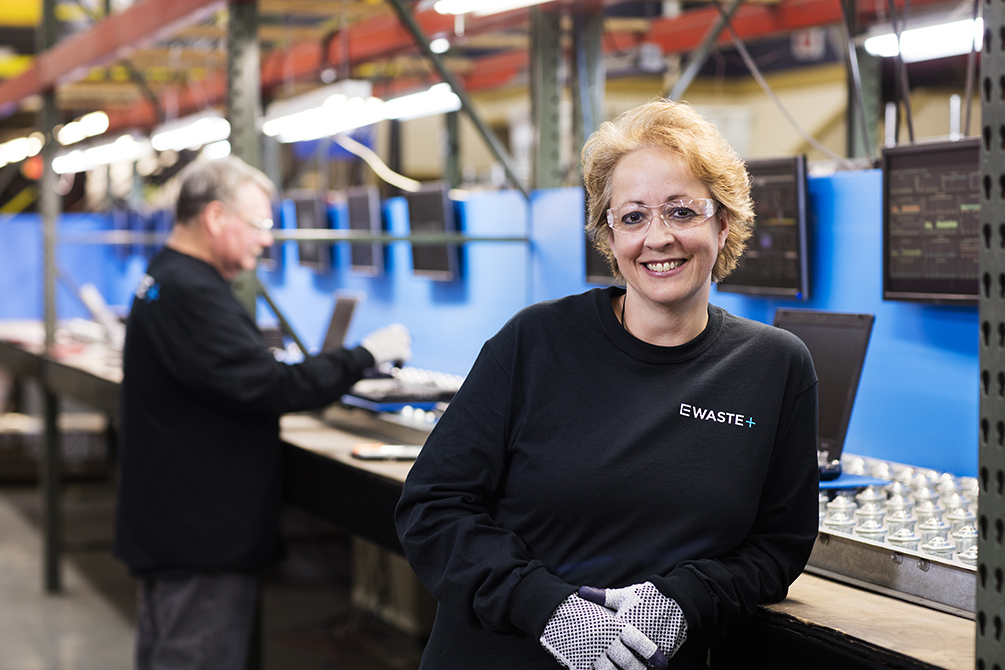
Lithium Ion Battery Recycling
With nearly 4 billion batteries purchased in the United State every year, batteries are one of the most consumptive products that require a significant amount of mining each year for use in everyday products from remotes and toys to as large as electric vehicles. The continued growth of batteries points towards a need to recycle these assets for re-use, recovering as many raw materials as possible for continued manufacturing.
DEC Compliance in Battery Recycling
Adhering to DEC Regulations in Battery Recycling
When recycling lithium-ion and other types of batteries, compliance with the Department of Environmental Conservation (DEC) regulations is crucial. DEC mandates specific handling, storage, and disposal procedures for hazardous waste, including batteries, to ensure environmental safety and public health. Following these guidelines, batteries must be processed in a manner that prevents environmental contamination, and facilities must adhere to strict storage time limits and safety protocols.
By partnering with a certified recycler like EWASTE+, businesses and individuals ensure that their battery disposal practices meet these stringent requirements, avoiding potential legal and environmental repercussions.
Maximizing Cost Savings through Waste Program Consolidation
Leveraging Consolidation for Enhanced Cost-Efficiency in Recycling
Integrating your battery recycling efforts with your ITAD and electronic recycling programs can lead to significant cost reductions. Consolidating these services with a single provider like EWASTE+ enhances logistical efficiency, reduces transportation and processing costs, and simplifies compliance tracking. This holistic approach not only saves money but also streamlines the recycling process, making it easier to manage and more effective at keeping hazardous materials out of landfills.
The Process of Recycling Batteries
Safe recycling is an essential part of re-using batteries, which require a significant amount of natural materials to produce. Properly disposing of batteries prevents toxic materials from breaking down into the environment as well. Batteries are specialized cells shaped into a tube and typically packaged in a round or flat casing, protecting dozens of cells. These cells may be comprised of a different type of metal depending on their chemistry, and often contain an electrolyte fluid to carry positive and negative charges between the two points of the cells.
In the recycling process, these batteries are separated into their individual components mechanically, and then chemically. For Lithium batteries, the batteries are smashed to expose the internal casing, and then submerged in basic water to neutralize the electrolyte and recover the metals. The battery is then processed, in this case, into lithium carbonate which can be reprocessed into new batteries.

Types of Battery Chemistry
Diverse Chemistries of Batteries and Their Recycling Needs
There are different types of battery chemistries that separate their type and are regulated differently. Older battery types include a rechargeable type of lead-acid combination, or rechargeable alkaline chemistries. More modern batteries include rechargeable nickel cadmium, nickel metal hydride, and rechargeable lithium ion batteries which provide exceptionally high energy density.
Here is the list of acceptable battery chemistries and types to recycle at EWASTE+:
- Nickel Cadmium (Ni-Cd & NiCad Dry)
- Nickel Metal Hydride (Ni-Mh & Ni-Mh Dry)
- Lithium Ion (Li-ion)
- Lithium Iron Phosphate (LiFePO₄)
- Lithium Polymer
- Lead Acid (Wet or Gel)
- Rechargeable
- Button Cells & Lithium Button Cells
- Silver Oxide (Ag₂O)
- Alkaline
- Mercury Batteries (Dry & Wet Cell)
- Zinc Air With Mercury
- Lithium Primary
- Carbon Air
- Carbon Zinc
- Zinc Chloride (ZnCl₂)
- Lithium Ion Cell Phone
- Lithium Sulphur Dioxide (LiSO₂)
- Lithium Manganese Dioxide (LiMnO₂)
- Lithium Thionyl Chloride (LiSOCl₂)
- Lithium Nickel Manganese Cobalt Oxide (LiNiMnCoO₂)
Each type of battery chemistry not only dictates the potential recycling methods but also the specific regulations and laws that apply to their disposal. Identifying the chemistry of a battery is crucial for determining the appropriate recycling process, especially for older types that may not be clearly labeled. By understanding these differences, recyclers like EWASTE+ can ensure that each type of battery is processed correctly, minimizing environmental impact and maximizing recovery of valuable materials.
Lithium Ion Battery FAQ
Key Questions and Answers About Lithium Ion Battery Recycling
Can Lithium Ion Batteries be Fully Recycled?
Lithium ion batteries are, unlike other types of batteries, infinitely recyclable due to their ability to be reconstituted as lithium carbonate which can then be processed into new components for batteries. There are new processes being developed to make this process as cost effective as possible, ensuring that lithium ion batteries become a renewable product that could be kept in manufacturing for its entire lifespan, rather than contributing to waste and additional harmful mining practices. Fortunately, lithium ion batteries are a prime target for the EV industry as well, ensuring that EV batteries are re-sold and re-manufactured, rather than being sent to a landfill at the end of the vehicle life cycle.
What Happens to Old Lithium Ion Batteries?
Old lithium batteries are typically recycled as they are reusable and able to be sent back through a manufacturing process without a loss in efficiency, creating new batteries from the same components. In this case, it is critical that lithium ion batteries are properly disposed of – sent to a recycling plant – instead of sent to a landfill. Ultimately, what happens to batteries depends on the consumer’s disposal, which is why electronic waste handling companies are essential for any business.
If you are looking to dispose of old lithium ion batteries, or any other type of battery, call EWASTE+ today.
How Do You Pack Your Batteries?
With a NYS Part 364 Universal Waste Handler Permit, EWASTE+ is certified to legally collect and transport batteries for recycling. For dry cell or rechargeable batteries such as Alkaline batteries, Ni-Cd, Ni-Mh, or Ni-Zn batteries, you must tape all the terminals of the batteries 9V or higher, excluding any batteries with liquid electrolytes or wet cell chemistries.
For wet cell, gel cell, steel cased and rechargeable batteries, the Department of Transportation requires all battery terminals are taped closed. Units should be stacked along the floor of your EWASTE+ bin or bucket, with a cardboard layer between new layers. There is a maximum limit of three layers.
We can accept lithium ion batteries including lithium button cells and laptop rechargeables. Lithium ion battery terminals must all be taped shut, and should only include lithium batteries in the collection bin.
Partner with EWASTE+ for Responsible Lithium Ion Battery Recycling
As the demand for batteries continues to surge, the importance of recycling cannot be overstated. EWASTE+ is committed to advancing sustainable practices in lithium ion battery recycling, helping to preserve our environment and reduce the reliance on raw material mining. By choosing EWASTE+ for your battery disposal needs, you contribute to a circular economy that extends the life of battery components and minimizes environmental impact.
Whether you’re a business looking to manage your battery waste or an individual seeking safe disposal options, EWASTE+ offers expert services tailored to meet regulatory standards and your specific needs. Our certified processes ensure that your batteries are handled with the utmost care, supporting global sustainability goals and promoting a greener future.
Contact EWASTE+ today to learn how you can be part of the solution in battery recycling and help create a sustainable tomorrow.


